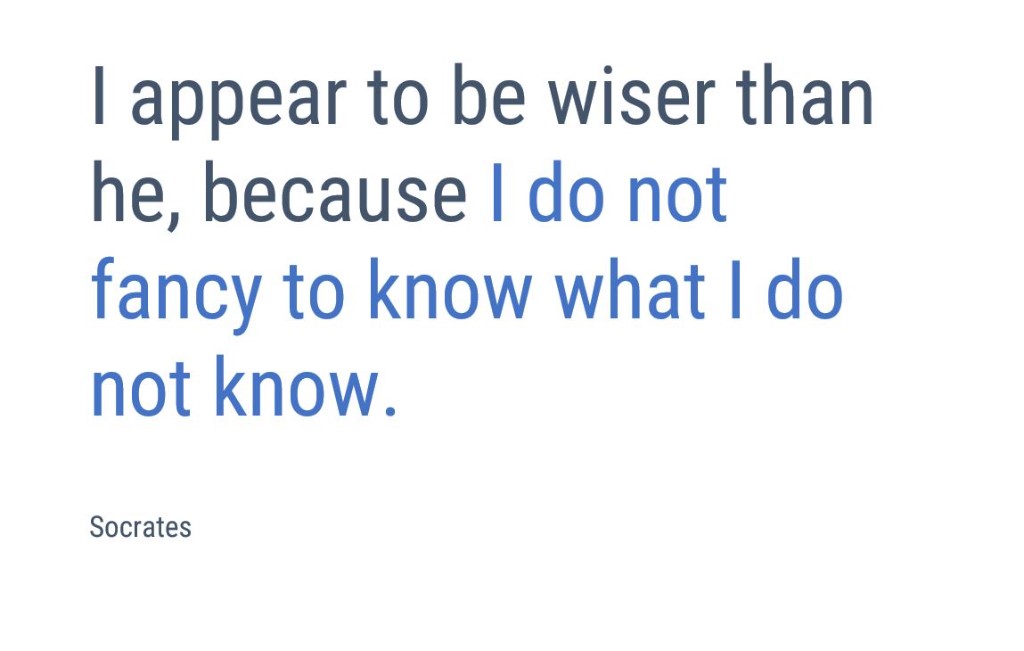The Knowledge Illusion
 When the Greek alphabet was first introduced, Socrates was not in favor of it. He believed a man's knowledge should be retained in his own head, and written word would make it far easier to be influenced by other people's thoughts.
When the Greek alphabet was first introduced, Socrates was not in favor of it. He believed a man's knowledge should be retained in his own head, and written word would make it far easier to be influenced by other people's thoughts.
At the center of Socrates’ objection to written word was a phenomenon known as the knowledge illusion. It arises because we fail to distinguish what is in our own head from that which is in other people’s heads.
Twenty-five centuries later, Socrates’ concerns have been largely realized. Our reality is that a good deal of our knowledge is community based and was not acquired or originated by us. It is worth pondering whether today we have outsourced our knowledge - and therefore our memory - to Google and Wikipedia. A quick Google search will evidence that there are more than a handful of neuropsychologists who believe that outsourcing our knowledge to the Internet is changing the physical shape of our brain, where memories are stored. The purpose of exploring this phenomena, thus, is to ensure we have a modern-day understanding of our relationship to collective wisdom, and the limits of our own mastery – in application - of knowledge that we failed to recognize as not our own, but as communal. As a personal illustration, I confess that every household project I ever attempted, I approached with complete confidence that I could accomplish it in half an hour, equipped only with my own common sense and less than $20 in materials. This approach yielded few, if any, successes. Eventually, I caught on to this pattern of defeat and now, I either hire a professional or at a minimum, YouTube before I started dismantling my washing machine, etc.
The Knowledge Illusion: Why We Never Think Alone, a recently released book authored by a pair of cognitive scientists, is an exceptionally worthwhile read that explores the phenomena in our modern context. The book is summarized as such by the publisher (Penguin Randomhouse):
“The human mind is both brilliant and pathetic. We have mastered fire, created democratic institutions, stood on the moon, and sequenced our genome. And yet each of us is error prone, sometimes irrational, and often ignorant. The fundamentally communal nature of intelligence and knowledge explains why we often assume we know more than we really do, why political opinions and false beliefs are so hard to change, and why individual-oriented approaches to education and management frequently fail. But our collaborative minds also enable us to do amazing things. This book contends that true genius can be found in the ways we create intelligence using the community around us.”
Overconfidence isn’t all bad. After all, the great expeditions of history - those that founded new continents or put a man on the moon – likely would not have happened had humankind lacked confidence in our ability to handle unknowable risks. In investing, however, there is simply a far narrower range of outcomes, and the consequences of not being aware of your limitations may be far greater than any possible pay-off. Knowing – or at least being aware of - what you don't know may be more important than what you do know.
Besides attributed information, this material is proprietary and may not be reproduced, transferred or distributed in any form without prior written permission from WST. WST reserves the right at any time and without notice to change, amend, or cease publication of the information. This material has been prepared solely for informative purposes. The information contained herein may include information that has been obtained from third party sources and has not been independently verified. It is made available on an “as is” basis without warranty. This document is intended for clients for informational purposes only and should not be otherwise disseminated to other third parties. Past performance or results should not be taken as an indication or guarantee of future performance or results, and no representation or warranty, express or implied is made regarding future performance or results. This document does not constitute an offer to sell, or a solicitation of an offer to purchase, any security, future or other financial instrument or product.
